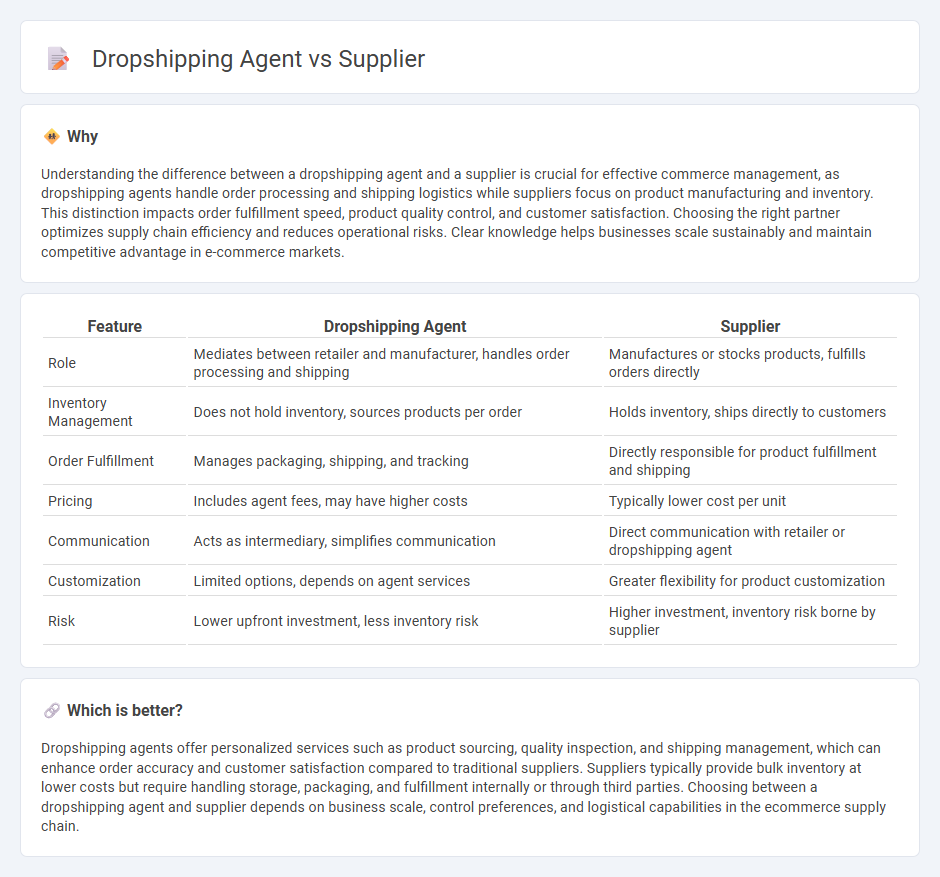
A dropshipping agent acts as an intermediary, managing product sourcing, quality control, and shipping logistics on behalf of retailers, while a supplier directly manufactures or stocks products for sale. Dropshipping agents streamline order fulfillment processes and enable access to multiple suppliers, reducing operational complexity. Discover how choosing between a dropshipping agent and a supplier can impact your e-commerce business efficiency and growth.
Why it is important
Understanding the difference between a dropshipping agent and a supplier is crucial for effective commerce management, as dropshipping agents handle order processing and shipping logistics while suppliers focus on product manufacturing and inventory. This distinction impacts order fulfillment speed, product quality control, and customer satisfaction. Choosing the right partner optimizes supply chain efficiency and reduces operational risks. Clear knowledge helps businesses scale sustainably and maintain competitive advantage in e-commerce markets.
Comparison Table
| Feature | Dropshipping Agent | Supplier |
|---|---|---|
| Role | Mediates between retailer and manufacturer, handles order processing and shipping | Manufactures or stocks products, fulfills orders directly |
| Inventory Management | Does not hold inventory, sources products per order | Holds inventory, ships directly to customers |
| Order Fulfillment | Manages packaging, shipping, and tracking | Directly responsible for product fulfillment and shipping |
| Pricing | Includes agent fees, may have higher costs | Typically lower cost per unit |
| Communication | Acts as intermediary, simplifies communication | Direct communication with retailer or dropshipping agent |
| Customization | Limited options, depends on agent services | Greater flexibility for product customization |
| Risk | Lower upfront investment, less inventory risk | Higher investment, inventory risk borne by supplier |
Which is better?
Dropshipping agents offer personalized services such as product sourcing, quality inspection, and shipping management, which can enhance order accuracy and customer satisfaction compared to traditional suppliers. Suppliers typically provide bulk inventory at lower costs but require handling storage, packaging, and fulfillment internally or through third parties. Choosing between a dropshipping agent and supplier depends on business scale, control preferences, and logistical capabilities in the ecommerce supply chain.
Connection
A dropshipping agent acts as the intermediary between the retailer and the supplier, handling order fulfillment, inventory management, and shipping logistics on behalf of the retailer. Suppliers provide the products that the dropshipping agent sources, stores, and ships directly to customers, enabling retailers to operate without holding physical inventory. Effective collaboration between dropshipping agents and suppliers streamlines the supply chain, reduces operational costs, and improves delivery speed in e-commerce.
Key Terms
Inventory Ownership
Suppliers retain full inventory ownership, managing stock and shipping directly to retailers or customers, ensuring control over product quality and availability. Dropshipping agents act as intermediaries without owning inventory, facilitating order fulfillment by connecting retailers with suppliers. Explore the distinctions further to optimize your e-commerce strategy effectively.
Order Fulfillment
Order fulfillment in supplier partnerships involves direct inventory management and shipping control, ensuring consistent product quality and delivery timelines. Dropshipping agents act as intermediaries, coordinating orders between customers and suppliers without holding stock, often resulting in faster scaling but less direct oversight. Explore the key differences in order fulfillment strategies to optimize your supply chain efficiency.
Profit Margin
Profit margin in dropshipping often appears thinner compared to directly sourcing from suppliers due to extra fees and middleman costs. Suppliers generally offer more competitive wholesale prices that enhance profit potential by eliminating intermediary charges. Explore detailed comparisons to optimize your e-commerce strategy and maximize profitability.
Source and External Links
What Is a Supplier and What Is Their Role in a Business? - A supplier is a person or business that provides a product or service to another entity, bridging the gap between manufacturers and retailers by supplying raw materials, products, or services that businesses need for their operations.
Vendors vs. Suppliers: Understanding the Key Differences - A supplier supplies large quantities of raw materials or components essential for manufacturing businesses and establishes critical B2B relationships that impact production quality and timely delivery.
What is a supplier? | ProcurePort Definition - A supplier is an individual or organization that provides goods, services, or materials to another organization, playing a crucial role in procurement and supply chain management, categorized as primary, secondary, or tertiary suppliers based on their relationship with buyers.
 dowidth.com
dowidth.com